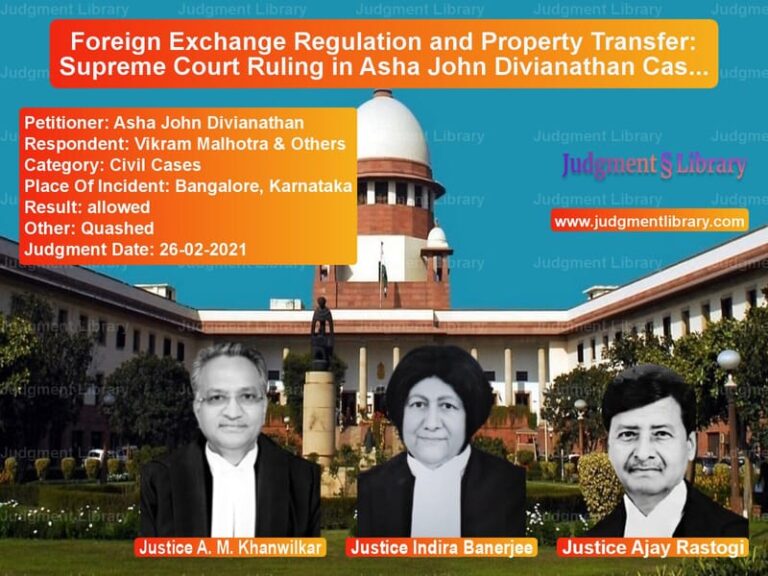Specific Performance of Property Sale: Supreme Court Upholds Buyer’s Rights Against Seller’s Objections
The case of Rajbir vs. Suraj Bhan & Anr. revolves around the execution of a decree for specific performance in a property sale dispute. The Supreme Court addressed the procedural irregularities in the execution of a sale deed and reaffirmed the necessity of following proper legal procedures under Order XXI Rule 34 of the CPC before executing such a decree.
Background of the Case
The appellant, Rajbir, along with his brother, had agreed to sell a parcel of land to the respondents, Suraj Bhan and Balraj, through an agreement dated January 28, 2006. However, Rajbir later sold the land to a third party, leading the respondents to file a suit for specific performance.
The trial court decreed the suit on January 4, 2013, directing Rajbir to execute and register the sale deed in favor of the respondents upon payment of the remaining sale consideration. The decree also stated that if Rajbir failed to execute the sale deed, the respondents could seek execution through the court.
Key Issues Raised
- Whether the decree holders (buyers) had deposited the remaining sale consideration as required by the decree.
- Whether the execution of the sale deed was carried out in accordance with the decree.
- Whether procedural safeguards under Order XXI Rule 34 CPC were followed.
Petitioner’s (Rajbir) Arguments
Rajbir objected to the execution proceedings, contending that:
- The respondents had not deposited the remaining sale consideration in full, as required by the decree.
- The draft sale deed had not been served on him, denying him the opportunity to file objections.
- The sale deed was executed without compliance with Order XXI Rule 34 CPC, which mandates that a draft must be served to the judgment debtor before execution.
- The executed sale deed pertained to a different survey number than what was decreed.
Respondents’ (Suraj Bhan & Balraj) Arguments
The respondents countered that:
- The decree specified that they needed to deposit the remaining sale consideration within one month of the judgment, which they had done.
- The property in question was correctly identified and matched the decree.
- The objections raised by the appellant were merely intended to delay execution.
- The sale deed was executed in compliance with the court’s orders.
Supreme Court’s Observations
The Supreme Court found merit in the petitioner’s contention that the execution process had procedural irregularities. The Court noted:
“Order XXI Rule 34 CPC mandates that the draft sale deed must be served to the judgment debtor, and objections must be invited and adjudicated before execution.”
The Court further observed:
“Failure to follow due process not only affects the rights of the judgment debtor but also undermines the legitimacy of the execution proceedings.”
Final Judgment
The Supreme Court allowed the appeal and directed the execution court to:
- Serve a copy of the draft sale deed to the appellant within two weeks.
- Permit the appellant to file objections within three weeks.
- Hold a hearing and adjudicate on the objections before proceeding with execution.
- If any discrepancies are found in the sale deed, order necessary corrections.
The Court also held that if the executed sale deed is found to be inconsistent with the decree, it shall be set aside, and a fresh sale deed shall be executed in compliance with the decree.
Implications of the Judgment
This ruling has significant implications for property transactions and the enforcement of specific performance decrees:
- It strengthens procedural safeguards in property execution proceedings.
- It reinforces that execution courts cannot bypass due process under Order XXI Rule 34 CPC.
- It ensures that judgment debtors have the opportunity to raise objections before execution.
- It provides clarity on the responsibilities of decree holders in fulfilling their obligations.
Conclusion
The Supreme Court’s decision in Rajbir vs. Suraj Bhan & Anr. reinforces the importance of following procedural requirements in the execution of specific performance decrees. The judgment ensures that property transactions carried out under court orders comply with the law, protecting the rights of all parties involved. This ruling serves as a guiding precedent for future cases where procedural compliance in execution proceedings is contested.
Read also: https://judgmentlibrary.com/supreme-court-rules-on-land-ownership-dispute-in-mumbai-case-analysis/
Petitioner Name: Rajbir.Respondent Name: Suraj Bhan & Anr..Judgment By: Justice K.M. Joseph, Justice Hrishikesh Roy.Place Of Incident: Jhajjar, Haryana.Judgment Date: 28-02-2022.
Don’t miss out on the full details! Download the complete judgment in PDF format below and gain valuable insights instantly!
Download Judgment: rajbir-vs-suraj-bhan-&-anr.-supreme-court-of-india-judgment-dated-28-02-2022.pdf
Directly Download Judgment: Directly download this Judgment
See all petitions in Property Disputes
See all petitions in Contract Disputes
See all petitions in Judgment by K.M. Joseph
See all petitions in Judgment by Hrishikesh Roy
See all petitions in allowed
See all petitions in Remanded
See all petitions in supreme court of India judgments February 2022
See all petitions in 2022 judgments
See all posts in Civil Cases Category
See all allowed petitions in Civil Cases Category
See all Dismissed petitions in Civil Cases Category
See all partially allowed petitions in Civil Cases Category







